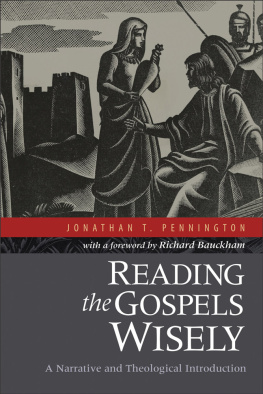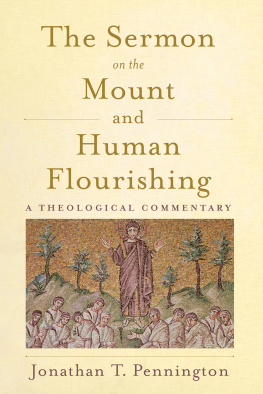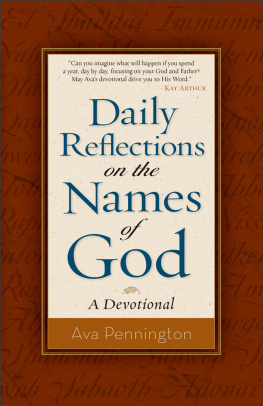Some Helpful Reading
Bernard of Clairvaux. The Works of Bernard of Clairvaux. Trans. Michael Casey et al. Spencer, Mass., and Kalamazoo, Mich.: Cistercian Publications, 1969.
Chu-Cong, Joseph. The Contemplative Experience. New York: Crossroad, 1999.
Horney, Karen. Neurosis and Human Growth. New York: Norton, 1991.
Keating, Thomas. Open Mind, Open Heart. Warwick, N.Y.: Amity House, 1986.
_____. Reawakenings. New York: Crossroad, 1992.
_____. Invitation to Love. New York: Crossroad, 1993.
_____. Intimacy with God. New York: Crossroad, 1994.
Keyes, Ken. Handbook to Higher Consciousness. Coos Bay, Ore.: Love Line Books, 1975.
May, Gerald. Addiction and Grace: Love and Spirituality in the Healing of Addictions. San Francisco: Harper, 1961.
_____. Will and Spirit: A Contemplative Psychology. San Francisco: Harper, 1982.
McGinn, Bernard. The Growth of Mysticism: Gregory the Great through the Twelfth Century. New York: Crossroad, 1994.
Merton, Thomas. The New Man. New York: Farrar, Straus and Giroux, 1961.
_____. New Seeds of Contemplation. New York: New Directions, 1961.
_____. The Climate of Monastic Prayer. Spencer, Mass.: Cistercian Publications, 1969.
_____. Contemplation in a World of Action. New York: Doubleday, 1971.
_____. Six Letters. With Boris Pasternak. Lexington, Ky.: King Library Press, 1973.
_____. A Search for Solitude: The Journals of Thomas Merton: Volume Three, 19521960. Ed. Lawrence S. Cunningham. San Francisco: HarperCollins, 1996.
Pennington, M. Basil. Centering Prayer: Renewing an Ancient Christian Prayer Form. New York: Doubleday, 1980.
_____. Call to the Center. New York: Doubleday, 1990; Hyde Park, N.Y.: New City Press, 1995.
_____. Thomas Merton Brother Monk. New York: Continuum, 1997.
_____. Lectio Divina: Renewing the Ancient Practice of Praying the Scriptures. New York: Crossroad, 1998.
_____. Centered Living. Liguori, Mo.: Liguori, 1999.
Piaget, Jean, and Barbel Inhelder. The Psychology of the Child. New York: Basic Books, 1969.
Reininger, Gustave, ed. Centering Prayer in Daily Life and Ministry. New York: Continuum, 1998.
_____. The Diversity of Centering Prayer. New York: Continuum, 1999.
Toolan, David S. Praying in a Post-Einsteinian Universe, Cross Currents 46 (1997): 43770.
Wilber, Ken. Up from Eden: A Transpersonal View of Human Evolution. Wheaton, Ill.: Quest, 1996.
William of St.Thierry. The Works of William of St.Thierry. Trans. Penelope Lawson et al. Spencer, Mass., and Kalamazoo, Mich.: Cistercian Publications, 1969.
Table of Contents
Landmarks
The Crossroad Publishing Company
www.crossroadpublishing.com
Copyright 2000 by Cistercian Abbey of Spencer, Inc.
All rights reserved. No part of this book may be reproduced, stored in a retrieval system, or transmitted, in any form or by any means, electronic, mechanical, photocopying, recording, or otherwise, without the written permission of The Crossroad Publishing Company.
Printed in the United States of America
Library of Congress Card Number: 00-101127
ISBN 0-8245-1845-4 (alk. paper)
To Theresa Ee-Chooi
and
all those lay persons
who have dedicated their time and their labor
to open to their sisters and brothers
the contemplative dimension of life
We labor unceasingly
to preserve an imaginary existence
and neglect the real.
Blaise Pascal
Contents
Welcome!
As I sat down at my computer to write this book I was profoundly aware of how central this concern is to each one of us humans on the journey: Just who am I? Who is my true self? Do I really identify with my true self? Or do I identify my false self as my true self? Is such a false identification the root of all the discontentedness I have experienced in my life? How can I uncover my false self and get rid of it? Is this false self the self Jesus is speaking about when he tells his followers that we must die to self? How can I find my true self and know the wondrous joy of being truly myself?
These have been basic questions in my life. And I suspect at least at one time or another in the life of every reflective human being. By the grace of God and with the help of good teachers, I have found some answers. They may not be the answers or answers that work for everyone. I know that these answers can be expressed in many different ways. I know that there are different paths that can lead to living out these answers. And this I know. The answers that I have been led to and that I have sought to live have led me into a joy and happiness far beyond anything I ever dreamed existed. And they give me the constant promise of ever-fuller joy and fulfillment in my life as I continue on my journey.
My love for you should have been more than enough motive to write these pages and share these insights with you. But I must confess that I have finally sat down and written this book in response to a promise.
In the course of the past decades, whenever I was leading a Centering Prayer program, if there was sufficient time, I would speak about the fruits of Centering Prayer. I did this with a certain amount of diffidence. For if we practice Centering Prayer with an eye on the fruits we hope to get out of it, it is no longer really Centering Prayer. We are back centered on ourselves, wanting to get something for ourselves. The essence of Centering Prayer is that we center on God, that we give ourselves as fully and as purely as possible to God, not seeking anything for ourselves. We say in essence: I am all yours, Lord.
And yet we know that our God is so good that all that God would have us do and be is to our own good. It is precisely in this that God finds glory. As Augustine of Hippo, who is considered one of the great fathers of the western Church, so beautifully said, The glory of God is the person fully alive. All things are yours and you are Christs and Christ is Gods, is the way St. Paul summed it up. While we do not want to go to Centering Prayer seeking something for ourselves, the Prayer does in fact produce very real fruits in our lives, fruits we want and need.
When I spoke about these fruits in the course of the Centering Prayer programs, the first one I usually spoke of is a transformation of consciousness. Then in order to put this in its fuller context I would speak of the evolution of human consciousness. And then I would bring it back to a very immediate and personal concern by speaking of the healing of memories.
This part of the program always excited considerable interest. I was often asked if I had written anything about this. My response was that I did not yet feel I was ready to write about it. I still feel I have not, by any means, totally encompassed the richness of these realities.
A few years ago I had the joy of bringing Centering Prayer to Malaysia. In the course of a very short time I was able to share the Prayer with over a thousand people, including many of the bishops and priests of that beautiful country. This opening was largely due to a remarkable woman of that country, the president of the International Catholic Press Association, Theresa Ee-Chooi. It was Theresa who extracted from me the promise that I would write a short book about the true and false self, about the transformation of consciousness and the evolution of human consciousness.















